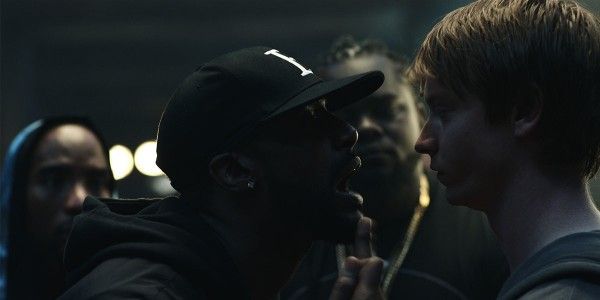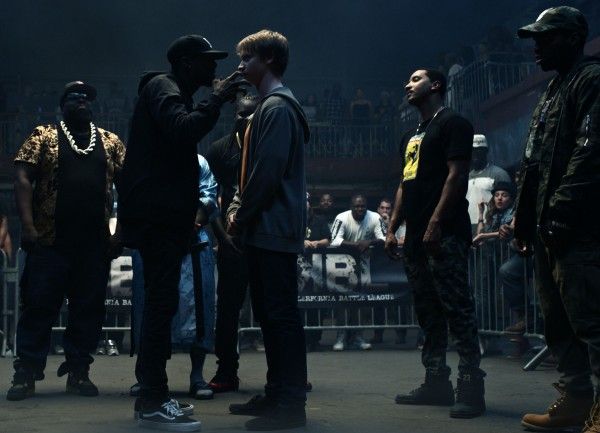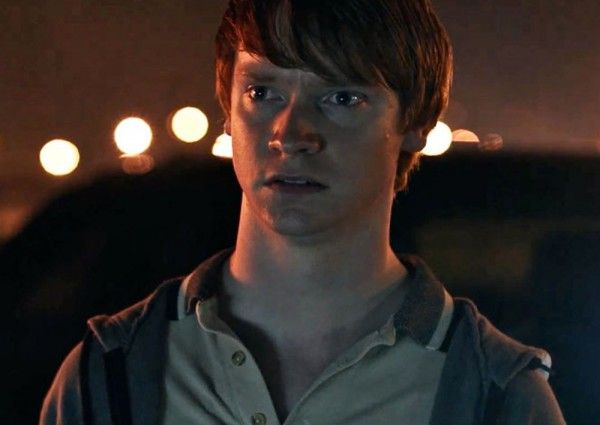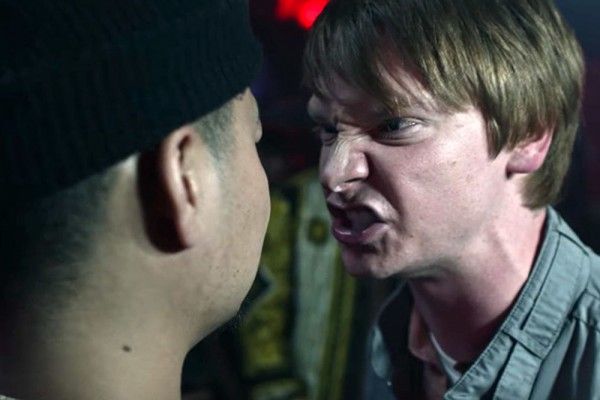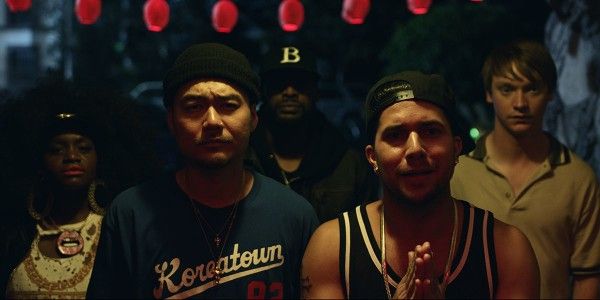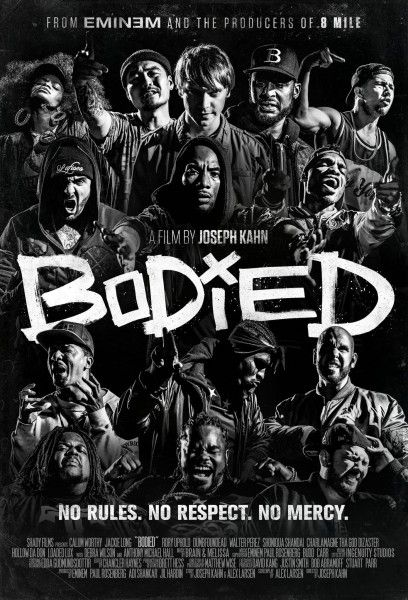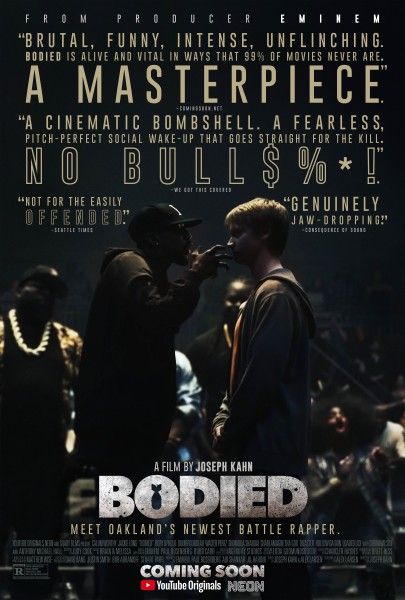Directed by Joseph Kahn, written by Alex Larsen (former rap battler Kid Twist) and produced by Eminem, the sure to be controversial flick Bodied is the satirical story of Adam Merkin (Calum Worthy), a grad student who interest in battle rap as a thesis subject leads to him becoming an accidental battle rapper himself. As his success sparks outrage, his competitive obsession puts him at odds with his family and friends.
At the Los Angeles press day for the film (which is in theaters on November 2nd and available to stream on YouTube Premium on November 28th), filmmaker Joseph Kahn talked about how his idea of what being a filmmaker is has changed over the last 30 years, the challenges of self-financing his movies, why he makes so few movies, juggling film with music videos and TV, why Bodied was difficult to get distribution for, how he lost his original lead just before filming began, what made Calum Worthy the perfect actor for the job, getting the rap battle aspect right, and whether he’d ever make a movie with Taylor Swift (they’ve done music videos together for “Delicate,” “End Game,” “Ready for It?,” “Look What You Made Me Do,” “Out of the Woods,” “Bad Blood” and “Blank Space”).
Collider: With everything you had to go through, in self-financing this movie, is this the vision that you always had for it? Is this the movie that you always wanted to make, from the second you thought about making this?
JOSEPH KAHN: Oh, yeah.
That must be really rewarding.
KAHN: Yeah, that’s actually the trick behind being a filmmaker, in this stage of my career. I remember when I first started trying to be a filmmaker, 30 years ago. You try to conceive what it’s like to be a filmmaker, and all the choices you have to make. I remember being in film school and they said, “For The Godfather, Francis Ford Coppola dipped all of those wedding dresses you saw in coffee and tea to make them look older.” I was like, “Oh, my god, I will never be able to get my head wrapped around that and think about those details. How will I ever be a director?” Now, 30 years later, I’m like, “You know what? That’s my job.” My job is to preconceive things and execute what’s in my head. Now, I feel very comfortable with that. If I didn’t have confidence that it will come out like what I’m thinking, I would never spend millions of dollars the way that I do.
Did you get to a point where you just knew you’d have to self-finance to make what you wanted to make, and to do it without having to be in the studio system?
KAHN: No, I don’t mind dealing with the studio system. I just happen to have made a couple of things in a row where it’s impossible to get through the studio system. The way it’s changing, people don’t even see movies in theaters anymore, and the types of movies they’re willing to pay for in a theater have to have some guy that flies around, or something. I just have two people screaming bad words at each other. What’s the market for that movie?
You’ve made three movies in about 15 years. Why so few?
KAHN: It just works out that way. I truly want to be a filmmaker, but my definition of filmmaker has changed, over 30 years. I always wanted to be a music video director and a filmmaker and a short film guy, which is what I’m doing now. The problem is that I have such a busy career doing commercials and music videos that I literally sometimes recoil at the fact that there’s a interesting music track that comes across my desk. Once I engage with it, I’m reluctant about it because I realize that, as soon as I say yes to that, three months of my life will be gone. I will think about nothing but that, and then, three months later, I’ll have a new music video that I’m very proud of, but three months of my life just completely passed by. If you do a couple of those in a row, years fly by. That’s the story of my life. All of these years just fly by, doing all of these music videos and commercials, that I’m not even aware of. Then every five or seven years, I get to make a movie.
Typically, it seems like people want to use music videos as a stepping stone to what they can do next, but it seems like you enjoy doing both videos and films.
KAHN: That’s because I’m still fascinated by the quantum mechanics of filmmaking. I’m still interested in the tiniest detail of how an edit locks together, or what different colors do to your brain. When there’s a new musical beat that comes across that feels like it could be expressed in some interesting visual, what is that visual? I’m still fascinated by every tiny little detail about filmmaking that, regardless of whether it’s a two hour film or a 30 second commercial, it’s all gravy to me.
Do you see yourself getting to a point where you have to leave music videos behind to do more films?
KAHN: I hope I just always get to do everything. I don’t know if, in today’s world, you have to be one or the other because media itself is changing. When I was first going to NYU film school, I was the only guy in class who wanted to do music videos. They literally ridiculed me and said, “That’s not filmmaking.” There was this perception that, if the film wasn’t two hours long, it’s not filmmaking, and I don’t think people think like that anymore. Quite frankly, the landscape of media has changed, where the validity of a 15-second piece of promo versus a 30-hour television series, all blends together. Ultimately, it’s the same filmmaking. Being able to do short form has given me a wonderful luxury of being able to constantly shoot every two weeks. If you’re a filmmaker, and you’re a Hollywood filmmaker, you make a movie once every couple of years. If you made three or four movies in a decade, you’re a hot filmmaker. You’re Christopher Nolan. But the reality is that you shoot maybe a couple months out of every three or four years. How much are you actually getting to really explore filmmaking, if all you get is just a couple of months, every couple of years, to do your craft? In what universe will you grow as an artist? So, the beautiful thing is that I’ve been afforded this absolute luxury of being able to shoot every two weeks and test out new ideas and constantly be engaged in filmmaking on a rhythmic level, so my rhythm keeps building over a couple of years, as opposed to going, “Oh, I’ve gotta stop, write a script and wait two years before I can do something else.”
You’ve also directed a bit of TV, and I have to admit that I was a huge fan of Sweet/Vicious. What was your experience like, directing the first two episodes of that series?
KAHN: I actually think it’s quite unfortunate they canceled that so early because it’s very topical now. Jen [Kaytin Robinson] wrote the show, and she wrote an amazing script. It was sent to me, and I just loved all of the mechanics. I also felt like there was a point of view. I’m not female, so on a certain level, I”m not the perfect director for a series like that. But the reality is that I’m not the perfect director for anything I do because I’m an Asian American male. What commonality do I have with Taylor Swift? What commonality do I have with the rap world? I’m an outsider in everything, so when you hire me as a director, you’re always looking at an outsider trying to analyze it from the outside in, like a professor. When I did Sweet/Vicious, it was an interesting opportunity for me to think like someone else, and to actually explore the female point of view. How many times in your life do you get to actually explore that? It was a fun thing. Sometimes I take on projects because I’m familiar with the material. Sometimes it excites me because I don’t understand the material, and by doing it, I get to explore a perspective. That was Sweet/Vicious for me.
Did it make you want to try doing more episodic TV, at all?
KAHN: I did. I followed that up with an episode of Crazy Ex-Girlfriend. Then, I just did an episode of Happy for Syfy, which is probably my most insane thing that I’ve done in TV, so far. Brian Taylor, the showrunner, reached out to me and I said, “If I’m gonna do the show, make it crazy.” And he wrote the most insane episode. I do things in the episode that you cannot get away with in movies. That’s the most odd thing about TV. TV is now the place where you can do crazy things that you could never do in a movie theater. Although, I will say that you couldn’t do Bodied on TV. Bodied, you can’t do on anything.
Was it surprising to you that it took a little while to get a distributor for the film, or did you expect that to be a challenge?
KAHN: I just didn’t know what was going to happen. I knew that I had to make it, so I proceeded to do that and put the money into it. I was on the hook for all this money. I had no idea who was going to pick it up or not. I suspected that it was going to probably be tough because of the language and the rule-breaking, in terms of the culture today. We live in a world where everybody is offended by everything, and there’s always a reason to be offended. This film is nothing but offensive things going on for two hours. I had so many people come back to me from the studios going, “I love this movie. It’s my favorite movie of the year, but I can’t distribute it because corporate won’t let me.”
How did you find the right home to release this film?
KAHN: Well, YouTube reached out and they wanted to take a chance on it. I found it quite liberating, that they were willing to take a big chance like this. They wanted to make a big statement for their premium service. If you think about YouTube itself, it makes perfect sense because they are in the culture of distributing free speech. YouTube was formed on the idea that the smallest voice gets the opportunity to have the biggest soapbox, if people want to see it. It’s turned nobodies into stars. Quite frankly, it’s the ground zero for this explosion of how we view media and distribution channels. It’s the only place where you can release something this dangerous, and the audience will go, “Well, that’s part of what YouTube is.” I think people thought that YouTube was a very unconventional choice, but if you really think about it, in terms of what this film does, what it represents, and the nature of freedom of speech, YouTube is absolutely the perfect place to put it. Let’s just flat out say it, most places are not brave enough to distribute Bodied because they have too many people to answer to, and the culture is such that they’re classy joints and they make classy movies. Bodied is punk rock. It’s rap, but it’s punk rock, at the end of the day. We needed a distributor that embraced that. In combination with Neon, who is a very edgy, independent distributor for theatrical releases, we found our home, and I’m quite happy with it.
You’ve talked about how challenging it was to cast this, and how you lost your lead actor, a couple weeks before shooting, because they wimped out. Did you see that coming?
KAHN: No. That was the shocking thing about casting this movie because I felt like we had written an amazing script. Alex Larsen is just this lyrical genius, and when I read the script I was laughing, from beginning to end. I felt like there was such a deep character here, in terms of my protagonist/antagonist, Adam. I thought, “My god, we should have our pick of the litter in Hollywood of young white male actors that want to play this role.” But, that didn’t happen. In fact, every one of them backed out and didn’t want to do it because of the language. I just realized that most of the actors in Hollywood are not really actors. They’re in the star-making business. They’re trying to run corporations for themselves and make a living. True artists, even if they like the script, felt it could be bad for their branding, to say some of the words that Adam does. It was only Calum Worthy who loved the script and did not care what it would do to his image, and that’s fantastic. He completely embraced the character and did everything the script needed him to do.
After having somebody drop out like that, were you worried that he still might change his mind before the shoot started?
KAHN: No. Here’s the thing, as soon as an actor – and he was a pretty significant, well known actor with a pretty good, high profile following, but I will not name names – wimps out like that, it’s almost a godsend. You’re like, “Well, this guy could never have committed because he’s too weak of a human being.” To me, acting is not safe. If you’re doing it properly, acting is one of the most dangerous things you can possibly do. You’re so vulnerable. You’re putting yourself out there to seek out the truth. It’s going to hurt a bit, and you have to be fearless about what people perceive you as. If you’re a real actor, you’re truly servicing the story. That’s what Calum did. Calum’s not worried about his image. Calum isn’t worried about how people think. Calum was just thinking, “What is best for the scene?” That’s who I want to partner up with. As soon as someone drops out, they aren’t right for the role, anyways. Quite frankly, Calum was the perfect actor.
How did you make sure that he’d be ready for the rap aspect of this?
KAHN: The beauty of it is that when Calum walked through the door, he was clearly the best actor. He had the best comedic timing and the best combination of comedy plus empathy. But I’m not kidding you, he was the worst rapper who walked through the door. This kid could not rap to save his life. He came in there with some weird faux Run DMC inflection from 1985, and the Canadian in him was all over the place. He might as well have walked into the audition in a red costume on a moose. But after I casted him, he went into hardcore research. He watched every rap battle. He met up with every great rapper in the movie like Dizaster, Dumbfoundead, and Charlamagne Tha God. They all coached him. He walked in as a little baby with a plastic light saber, and then he got trained by Darth Vader and came out swinging that light saber, killing people left and right. Now, he’s a weaponized battle rapper, which is amazing to watch. The other subtle thing about what he did, is that his rapping changes throughout the movie. It gets angrier. In the beginning, he’s shy, but then you get to really see the progression of his rap and, by the end, he’s just firing on all cylinders and he’s machine gunning people to death. It’s not just a tour de force of rapping. It’s rapping with the storytelling of his character. He’s a gifted actor.
I love how you shot the battle sequences because they feel like they have so much life to them. How did you decide the way you wanted to approach that?
KAHN: I did have to rethink my visual style for this movie. I had to really break down and try to figure out what I want to do. My last movie, Detention, was very formal, in terms of the camera work. Then, I did the Power Rangers short film, and that had a lot of formalism. What I didn’t want to do was just make a handheld movie, which is the easy way to do it. It’s this weird blend of formalism and handheld and docu-style. The idea is that you feel like you’re actually experiencing the movie, almost like a documentary, but it’s still got a constructed subjectivity to it, too. It was a tough thing to construct.
You’ve talked about how you’re on the same creative wavelength as Taylor Swift, and that that’s why you guys work together a lot. Have you ever thought about writing and directing a movie for her? Is that something you think she would ever want to do?
KAHN: I think Taylor is immensely talented, and I’d work with her on anything that Taylor ever wanted to do. I’ve had discussions with her, but she’s so focused on music. That’s her passion. I always talk about rocks and pebbles. Pebbles are in Hollywood. They do a million things, and they bounce around and go where the water goes. Rocks just put themselves in the stream and stay still and say, “I’m a rock,” while the pebbles move around them. Taylor is a rock. She knows that she’s a musician. She knows that she’s a songwriter. She knows that music is her life, so that’s her complete focus, at this point. It’s not for me to say whether or not she wants to do movies. I respect the fact that she is a musician.
Do you have any idea what you’re going to do next? Would you like to do another movie, sooner rather than later?
KAHN: These things are self-funded, and it takes forever to make my money back, if I make my money back. I have no idea what I’m going to do next. I’m always relieved, at the end of the process. I’m still registering what exactly it is that I made. I made what I was going to make, but I need a couple of years to step back from it, to really see what I made.
Bodied is now in theaters and is available to stream at YouTube Premium on November 28th.


